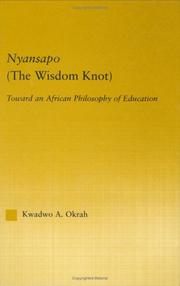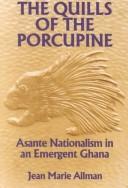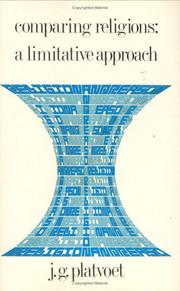| Listing 1 - 10 of 10 |
Sort by
|

ISBN: 1135938024 0415861098 128005932X 0203463897 9780203463895 0415947332 9781135937973 9781135938017 9781135938024 9780415947336 9780415861090 1135938016 Year: 2003 Publisher: New York Routledge
Abstract | Keywords | Export | Availability | Bookmark
 Loading...
Loading...Choose an application
- Reference Manager
- EndNote
- RefWorks (Direct export to RefWorks)
This study examines the issues of indigenous philosophies, which are embedded in different aspects of the socialization process among the Akan of Ghana.
Akan (African people) --- Philosophy, Akan. --- Education --- Akan philosophy --- Akans (African people) --- Twi Fante (African people) --- Ethnology --- Fanti (African people) --- Education. --- Philosophy.

ISBN: 1474470823 0748672737 0585443890 9780585443898 0253214963 9780253214966 0253340306 9780253340306 0748615105 9780748615100 9781474470827 9780748672738 Year: 2022 Publisher: Edinburgh
Abstract | Keywords | Export | Availability | Bookmark
 Loading...
Loading...Choose an application
- Reference Manager
- EndNote
- RefWorks (Direct export to RefWorks)
GBS_insertPreviewButtonPopup('ISBN:9780748615100);Asante Identitiesis an account of life in the Asante village of Ade beba in West Africa during a century of rapid change, told as far as possible in the words of the villagers themselves. Asante is the most intensely studied of all sub-Saharan African cultures, and this book takes Asante and African historiography to new levels of reconstruction , analysis and understanding. This is the most closely focused historical study thus far achieved of African people engaging with issues of selfhood, identity and agency in an era that saw the continent fall under European domination.Key FeaturesMajor contribution to African studies in its historical depth and analytic sophisticationA book of wider interest to non-Africanist historians, social scientists and othersConsiders issues of broad and current concern never before studied at this levelAsante Identities is a volume in the International African Library, a major monograph series from the International African Institute which complements its quarterly periodical Africa, the premier journal in the field of African Studies."
Ashanti (African people) --- Achanti (African people) --- Asante (African people) --- Asanti (African people) --- Ashante Twi (African people) --- Ashantee (African people) --- Ashantis (African people) --- Akan (African people) --- Ethnology --- History. --- Social life and customs. --- Adeeba (Ghana)

ISBN: 0585176159 9780585176154 9780299137632 0299137635 9780299137649 0299137600 0299137643 9780299137601 1282424041 9781282424043 9786612424045 6612424044 Year: 1993 Publisher: Madison, Wis.
Abstract | Keywords | Export | Availability | Bookmark
 Loading...
Loading...Choose an application
- Reference Manager
- EndNote
- RefWorks (Direct export to RefWorks)
Ashanti (African people) --- Nationalism --- Consciousness, National --- Identity, National --- National consciousness --- National identity --- International relations --- Patriotism --- Political science --- Autonomy and independence movements --- Internationalism --- Political messianism --- Achanti (African people) --- Asante (African people) --- Asanti (African people) --- Ashante Twi (African people) --- Ashantee (African people) --- Ashantis (African people) --- Akan (African people) --- Ethnology --- Politics and government. --- History --- Ashanti Region (Ghana) --- Ghana --- Ashanti (Ghana) --- Autonomy and independence movements. --- Politics and government
Book
Year: 2021 Publisher: Basel, Switzerland MDPI - Multidisciplinary Digital Publishing Institute
Abstract | Keywords | Export | Availability | Bookmark
 Loading...
Loading...Choose an application
- Reference Manager
- EndNote
- RefWorks (Direct export to RefWorks)
Energies SI Book "Selected Papers from the ICEUBI2019 – International Congress on Engineering – Engineering for Evolution", groups six papers into fundamental engineering areas: Aeronautics and Astronautics, and Electrotechnical and Mechanical Engineering. ICEUBI—International Congress on Engineering is organized every two years by the Engineering Faculty of Beira Interior University, Portugal, promoting engineering in society through contact among researchers and practitioners from different fields of engineering, and thus encouraging the dissemination of engineering research, innovation, and development. All selected papers are interrelated with energy topics (fundamentals, sources, exploration, conversion, and policies), and provide relevant data for academics, research-focused practitioners, and policy makers.
HVAC --- water-cooled condenser --- air-cooled condenser --- evaporative --- TWI --- turbulence modeling --- supercritical injection --- Liquid Rocket Engines --- energy saving and efficiency --- aerodynamic coefficients --- propulsive efficiency --- bioenergetics --- biomimetics --- grid-tied inverter --- grey wolf optimizer --- PR controllers --- LCL filter --- passive damping --- propeller --- aircraft --- turboprop --- flight efficiency --- flight speed --- hydro-thermal coordination --- Lagrangian relaxation --- Lagrangian dual problem --- Lagrange multipliers --- subgradient methods --- step-size update algorithm
Book
ISBN: 9781563686320 1563686325 9781563686337 1563686333 Year: 2015 Publisher: Washington, DC : Gallaudet University Press,
Abstract | Keywords | Export | Availability | Bookmark
 Loading...
Loading...Choose an application
- Reference Manager
- EndNote
- RefWorks (Direct export to RefWorks)
Lit. opg.;Reg.
Deaf culture --- Deaf --- Akan (African people) --- Ethnology --- #SBIB:39A9 --- #SBIB:39A73 --- #KVHA:Taalkunde; Gebarentaal --- #KVHA:Cultuurgeschiedenis; Gebarentaal --- Akans (African people) --- Twi Fante (African people) --- Fanti (African people) --- Deaf-mutes --- Deaf people --- Deafness --- Hearing impaired --- Deafblind people --- Deaf subculture --- Subculture --- Cultural anthropology --- Ethnography --- Races of man --- Social anthropology --- Anthropology --- Human beings --- Social life and customs. --- Marriage --- Medische antropologie / gezondheid / handicaps --- Etnografie: Afrika --- Patients --- Culture --- ethnology --- Social life and customs

ISBN: 9027931704 3110821818 9783110821819 9789027931702 Year: 2011 Volume: 24 Publisher: Berlin Boston
Abstract | Keywords | Export | Availability | Bookmark
 Loading...
Loading...Choose an application
- Reference Manager
- EndNote
- RefWorks (Direct export to RefWorks)
Akans (African people) --- IFO-Sananda (Religious group) --- Para (Surinam) --- Para (Suriname) --- -Negroes --- Twi Fante (African people) --- Fanti (African people) --- -Godsdienstwetenschap: vergelijkend --- IFO-Sananda (Religious group). --- -Comparative religion --- Akan (African people) --- Blacks --- Religions --- 291 --- Comparative religion --- Denominations, Religious --- Religion, Comparative --- Religions, Comparative --- Religious denominations --- World religions --- Civilization --- Gods --- Religion --- Negroes --- Ethnology --- Godsdienstwetenschap: vergelijkend --- District Para (Suriname) --- Religion. --- Religions. --- Black persons --- Black people --- Akan (African people) - Religion --- Blacks - Suriname - Para - Religion --- Para (Suriname) - Religion
Book
ISBN: 0739187864 9780739187869 9780739187852 0739187856 Year: 2015 Publisher: Lanham
Abstract | Keywords | Export | Availability | Bookmark
 Loading...
Loading...Choose an application
- Reference Manager
- EndNote
- RefWorks (Direct export to RefWorks)
This book analyzes the Asante transition to legitimate commerce in the nineteenth century and highlights the political and economic relationships of the Asante state with surrounding African groups and European traders.
Ashanti (African people) --- Slave trade --- Achanti (African people) --- Asante (African people) --- Asanti (African people) --- Ashante Twi (African people) --- Ashantee (African people) --- Ashantis (African people) --- Akan (African people) --- Ethnology --- Commerce --- History --- History. --- Ghana --- Chia-na --- Dēmokratia tēs Gkanas --- Gáana --- Gana --- Gana ka Fasojamana --- Gana Konghwaguk --- Gana Respublikaḣy --- Ganæ --- Ganah --- Ganao --- Ganmudin Orn --- Ghana Vabariik --- Ghanako Errepublika --- Ghaney --- Ghanská republika --- Gkana --- Government of Ghana --- Gweriniaeth Ghana --- Hana (Ghana) --- IGana --- Ochíchìíwú Ghana --- Pobblaght ny Ganey --- Poblachd Ghàna --- Poblacht Ghána --- Qana --- Qana Respublikası --- Repubblica del Ghana --- Republic of Ghana --- República de Ghana --- Rèpublica du Gana --- Republik Ghana --- Republika Gana --- Republiḳat Ganah --- République du Ghana --- Rėspublika Hana --- Respublikæ Ganæ --- Tjóðveldið Gana --- Yn Ghaney --- Γκάνα --- Δημοκρατία της Γκάνας --- Рэспубліка Гана --- Республикæ Ганæ --- Република Гана --- Ганæ --- Гана --- Ганмудин Орн --- רפובליקת גאנה --- גאנה --- ガーナ --- 가나 --- 가나 공화국 --- Ashanti --- Gold Coast --- Northern Territories of the Gold Coast --- Togoland (British) --- Economic conditions --- Relations
Book
ISBN: 9522227692 9522227935 9522226823 9789522227935 9789522227690 9789522227930 Year: 2016 Publisher: Helsinki : Finnish Literature Society / SKS,
Abstract | Keywords | Export | Availability | Bookmark
 Loading...
Loading...Choose an application
- Reference Manager
- EndNote
- RefWorks (Direct export to RefWorks)
The divine kingship and chiefship of the Asante people of central Ghana have been undergoing a shift towards secularization since the start of the colonial era. Timo Kallinen maintains that a close examination of this transformation provides us with a better understanding of secularization processes in Ghana more broadly, and in other post-colonial societies whose historical development likewise differs from that of the modern West, and which have largely confronted secular modernity through encounters with European colonialism. Throughout the volume secularization is understood as a process in modern society whereby divinity is separated from the ways in which both human society is regulated and physical nature is understood to function. Divine Rulers in a Secular State has been divided into three thematic parts, each with a short theoretical introduction. In the first two, analysis is primarily inspired by the work of Louis Dumont, while in the third the theoretical ideas of Webb Keane and Bruno Latour are of central importance. The undifferentiated order of the pre-colonial Asante kingdom, in which the chiefly and priestly functions of the rulers were not separated, comprises the initial focus. Sacrifices and marriage exchanges, both of which were directed at establishing and perpetuating relations between the living and the spirits of the dead ancestors, are posited as the most important responsibilities of the chief. Also explored are perceptions that the founding of the kingdom and its authority structure are the results of sacrifices offered to various gods by the Asante king and his chiefs. The second part examines the dissolution of the traditional order since the onset of British colonial occupation. The secularization process was initiated by the aspirations of colonial administrators and missionary bodies who aimed to maintain Christian converts under the ‘political’ authority of their non-Christian chiefs, who were still important ritual leaders. Consequently, it was necessary to start dividing society along ‘political’ and ‘religious’ lines so that only the former was a mandatory concern for all. The kernel of modern citizenship was planted at the same time as the ‘religious’ conscience of individuals started to shape their rights and duties towards their ‘political’ rulers. Furthermore, theories about Asante as a state based on contract and representation were proposed and developed. In the post-colonial era chiefship has been put into the service of the independent nation state - both as an instrument of administration and a nationalistic symbol, while, most recently, chiefs have been depicted as leaders in civil society, even receiving support from global developmental organizations. Yet traditional chieftaincy is strongly criticized by certain Christian groups belonging to the Pentecostal-Charismatic movement, which still see it as integrally linked to traditional cosmologies. The third part of the book takes the discussion beyond the separation of the categories of religion and politics. Secularization has also has also entailed the dematerialization of religion, establishing it as something that ought to be understood primarily as mental or spiritual; in a secular society 'things' like deities, witchcraft, or sacrifices should not be recognized as proper agents and actions at the level of immanent relations. In Ghana such views are effectively contradicted by religious groups which see spiritual forces as the most powerful agents in social relations. The cases discussed deal with attempted state control of anti-witchcraft activities, the efficiency of protective magic during political upheavals, and Pentecostal notions of demonic influences in secular politics. The Conclusions section brings the themes of the book together by discussing the large-scale effects of the secular project in contemporary Ghanaian society. Research is based on anthropological fieldwork conducted in Ghana in 2000-2001 and 2005-2006, data drawn from several archival sources located in Ghana and the United Kingdom, and the anthropological and historical literature on Ghana and the Asante.
Ashanti (African people) --- Ethnology --- Ethnohistory --- Secularism. --- History --- Kings and rulers --- Ghana --- Ashanti (Kingdom) --- Kings and rulers. --- Colonial influence. --- Ethnohistorical method --- Historical anthropology --- Historical ethnology --- Anthropology --- Achanti (African people) --- Asante (African people) --- Asanti (African people) --- Ashante Twi (African people) --- Ashantee (African people) --- Ashantis (African people) --- Akan (African people) --- Ethics --- Irreligion --- Utilitarianism --- Atheism --- Postsecularism --- Secularization (Theology) --- Methodology --- Asante (Kingdom) --- Chia-na --- Gana --- Republic of Ghana --- Ganah --- Government of Ghana --- Rèpublica du Gana --- Qana --- Qana Respublikası --- Gana ka Fasojamana --- Republik Ghana --- Гана --- Gana Respublikaḣy --- Hana (Ghana) --- Рэспубліка Гана --- Rėspublika Hana --- Република Гана --- Republika Gana --- Ghanská republika --- Gweriniaeth Ghana --- Gáana --- Ghana Vabariik --- Γκάνα --- Gkana --- Δημοκρατία της Γκάνας --- Dēmokratia tēs Gkanas --- República de Ghana --- Ganao --- Ghanako Errepublika --- Tjóðveldið Gana --- République du Ghana --- Poblacht Ghána --- Yn Ghaney --- Ghaney --- Pobblaght ny Ganey --- Poblachd Ghàna --- Ганмудин Орн --- Ganmudin Orn --- 가나 --- 가나 공화국 --- Gana Konghwaguk --- Ochíchìíwú Ghana --- Ганæ --- Ganæ --- Республикæ Ганæ --- Respublikæ Ganæ --- IGana --- Repubblica del Ghana --- גאנה --- רפובליקת גאנה --- Republiḳat Ganah --- ガーナ --- Togoland (British) --- Gold Coast --- Ashanti --- Northern Territories of the Gold Coast
Book
Year: 2022 Publisher: Basel MDPI - Multidisciplinary Digital Publishing Institute
Abstract | Keywords | Export | Availability | Bookmark
 Loading...
Loading...Choose an application
- Reference Manager
- EndNote
- RefWorks (Direct export to RefWorks)
Long-term exposure to environmental toxicants is estimated to account for 70–90% of the risks of acquiring chronic ailments. Presently, chronic kidney disease and infertility affect a significant proportion of the world population, while research data indicate that exposure to toxic metals may contribute to the looming statistics. Alarming evidence suggests that exposure to the heavy metal cadmium may affect every stage of life, and exposure in early life may determine susceptibility to certain diseases in adulthood. Prevention of these outcomes requires avoidance of further environmental contamination, minimization of exposure, and reduction of toxic metals in food crops to the lowest achievable levels.
Trace elements --- hair --- children --- hazardous waste incinerator --- Constantí (Catalonia, Spain) --- blood lead level --- boatyard --- childhood --- lead poisoning --- fishing community --- lead weights --- β2-microglobulin --- cadmium --- creatinine clearance --- glomerular filtration --- N-acetyl-β-d-glucosaminidase --- nephron mass --- nephrotoxicity --- trace elements --- autopsy tissues --- temporal trends --- creatinine excretion --- glomerular filtration rate --- lead --- kidney --- endocytosis --- metallothionein --- flow cytometry --- proximal tubule epithelial cells --- OGTT --- minimal model --- glucose response mechanism --- genotoxicity --- aluminum chloride --- rats --- food --- farmer --- PTWI (provisional tolerable monthly intake) --- TWI (tolerable weekly intake) --- Monte Carlo simulation --- mercury --- obesogen --- lipid profiles --- hyperlipidemia --- elevated liver enzymes --- hexavalent chromium [Cr(VI)] --- mitochondrial fragmentation --- dynamin-related protein 1 (Drp1) --- mitochondrial respiratory chain complex I (MRCC I) --- reactive oxygen species (ROS) --- blood lead --- cellular immunity --- phagocytosis --- humoral munity --- immunosuppression --- insulin --- diabetes --- hyperglycemia --- hyperinsulinemia --- lipogenic --- β-cell toxicity --- stroke --- cerebrovascular accident --- heavy metal --- rare earth element --- case-control study --- mortality --- lifetime cadmium intake --- renal diseases --- urinary cadmium --- a follow-up study --- diet --- kidney function --- chronic kidney disease --- threshold limit --- tolerable intake level --- heavy metals --- birth weight --- preterm birth --- diet pattern --- Mediterranean diet --- pregnancy --- toxic metals --- reproduction --- testicular and ovarian structure --- n/a --- Constantí (Catalonia, Spain)
Book
ISBN: 0253017017 9780253017017 9780253016942 0253016940 Year: 2015 Publisher: Bloomington, Indianapolis, Indiana : Indiana University Press,
Abstract | Keywords | Export | Availability | Bookmark
 Loading...
Loading...Choose an application
- Reference Manager
- EndNote
- RefWorks (Direct export to RefWorks)
"Although they came from distinct polities and peoples who spoke different languages, slaves from the African Gold Coast were collectively identified by Europeans as 'Coromantee' or 'Mina.' Why these ethnic labels were embraced and how they were utilized by enslaved Africans to develop new group identities is the subject of Walter C. Rucker's absorbing study. Rucker examines the social and political factors that contributed to the creation of New World ethnic identities and assesses the ways displaced Gold Coast Africans used familiar ideas about power as a means of understanding, defining, and resisting oppression. He explains how performing Coromantee and Mina identity involved a common set of concerns and the creation of the ideological weapons necessary to resist the slavocracy. These weapons included obeah powders, charms, and potions; the evolution of 'peasant' consciousness and the ennoblement of common people; increasingly aggressive displays of masculinity; and the empowerment of women as leaders, spiritualists, and warriors, all of which marked sharp breaks or reformulations of patterns in their Gold Coast past"--Provided by publisher.
African diaspora --- Power (Social sciences) --- Africans --- Blacks --- Slaves --- Akan (African people) --- Akans (African people) --- Twi Fante (African people) --- Ethnology --- Fanti (African people) --- Enslaved persons --- Persons --- Slavery --- Negroes --- Empowerment (Social sciences) --- Political power --- Exchange theory (Sociology) --- Political science --- Social sciences --- Sociology --- Consensus (Social sciences) --- Black diaspora --- Diaspora, African --- Human geography --- History. --- Ethnic identity --- Social conditions. --- Migrations --- Togo --- Côte d'Ivoire --- Ghana --- America --- Chia-na --- Dēmokratia tēs Gkanas --- Gáana --- Gana --- Gana ka Fasojamana --- Gana Konghwaguk --- Gana Respublikaḣy --- Ganæ --- Ganah --- Ganao --- Ganmudin Orn --- Ghana Vabariik --- Ghanako Errepublika --- Ghaney --- Ghanská republika --- Gkana --- Government of Ghana --- Gweriniaeth Ghana --- Hana (Ghana) --- IGana --- Ochíchìíwú Ghana --- Pobblaght ny Ganey --- Poblachd Ghàna --- Poblacht Ghána --- Qana --- Qana Respublikası --- Repubblica del Ghana --- Republic of Ghana --- República de Ghana --- Rèpublica du Gana --- Republik Ghana --- Republika Gana --- Republiḳat Ganah --- République du Ghana --- Rėspublika Hana --- Respublikæ Ganæ --- Tjóðveldið Gana --- Yn Ghaney --- Γκάνα --- Δημοκρατία της Γκάνας --- Рэспубліка Гана --- Республикæ Ганæ --- Република Гана --- Ганæ --- Гана --- Ганмудин Орн --- רפובליקת גאנה --- גאנה --- ガーナ --- 가나 --- 가나 공화국 --- Ashanti --- Gold Coast --- Northern Territories of the Gold Coast --- Togoland (British) --- Bereg Slonovoĭ Kosti --- Costa d'Avorio --- Costa de Bori --- Costa de Marfil --- Costa de Vori --- Couta d'Ivouèro --- Elfebeikischte --- Elfenbeinküste --- Elpendbānrīma --- Fil Dişi Sahili --- Fil Dişi Sahili Respublikası --- Ivoire, Côte d' --- Ivoorkus --- Ivory Coast --- Kot d'Ivoar --- Kot d'Ivuar --- Kōto Jibowāru --- Kōto Jibowāru Kyōwakoku --- Kōtojiboāru --- Kōtojibowāru --- Kōtojibowāru Kyōwakoku --- Obala Slonovače --- Panté Gadéng --- Republic of Côte d'Ivoire --- Republic of Ivory Coast --- Republic of the Ivory Coast --- Republica de Costa de Vori --- Republiek van Côte d'Ivoire --- Republika Kot d'Ivoar --- Republika Obala Slonovače --- République de Côte d'Ivoire --- République de la Côte d'Ivoire --- Rėspublika Kot d'Ivuar --- Territoire de la Côte d'Ivoire --- Рэспубліка Кот д'Івуар --- Република Кот д'Ивоар --- Кот д'Ивоар --- Кот д'Івуар --- コートジボワール --- コートジボアール --- 象牙海岸共和国 --- Dēmokratia tou Tonko --- Gweriniaeth Togo --- Lýðveldið Tógó --- Pobblaght ny Togo --- Poblachd Thògo --- Poblacht Thóga --- Repubblica Togolese --- Republic of Togo --- República Togolesa --- Republik Togo --- Republik Togoat --- Republika Togo --- Republiḳat Ṭogo --- République autonome du Togo --- République du Togo --- République togolaise --- Tahaleskai︠a︡ rėspublika --- Tóga --- Togo Vabariik --- Togoanska republika --- Togoko Errepublika --- Togolese Republic --- Togolese Republiek --- Togolesische Republik --- Togoleska republika --- Togolezskai︠a︡ Respublika --- Togská republika --- Togu --- Toha --- Toḣlmudin Orn --- T'oko (Republic) --- Tonko --- Tʼóogo --- Toqo --- Τόγκο --- Δημοκρατία του Τόγκο --- Тагалеская рэспубліка --- Тоhлмудин Орн --- Тога --- Того --- Тогоанска република --- רפובליקת טוגו --- טוגו --- 토고 --- Togoland (French) --- Togoland --- Americas --- New World --- Western Hemisphere --- Emigration and immigration --- Ethnic relations --- Black persons --- Black people --- Transatlantic slave trade
| Listing 1 - 10 of 10 |
Sort by
|

 Search
Search Feedback
Feedback About UniCat
About UniCat  Help
Help News
News